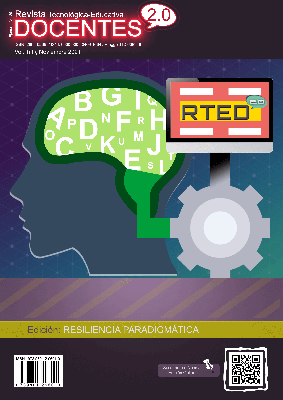University Digital Management: An Emerging Proposal in Pandemic Times
 DOI:
https://doi.org/10.37843/rted.v1i1.259
DOI:
https://doi.org/10.37843/rted.v1i1.259
Main Article Content
Abstract
Life and education are human rights established in the Declaration of Human Rights (Human Rights) document in which the United Nations Organization (UN) conceived in 1948. Until then, in Venezuela, the Institutions of University Education (IEU) carried out their functions in person, even though some had started learning processes mediated by technology. As a result, a proposal was generated under an integrating vision of four (4) dimensions: 1) Systematization of the information, 2) Staff training, 3) Articulation of the actors, 4) Monitoring and control of the model. Based on the preceding, the Academic Vice-Rector of the José Antonio Páez University diagnosed the administrative needs of the plan, establishing the objective of designing a digital management model to guarantee the continuity of university processes, both academic and administrative. The type of research was descriptive, with a documentary design, applied to a sample of four (4) faculties and two (2) general directorates. The evidence showed that the systematization of information and the staff training in administrative processes are crucial to university management, which was optimized by incorporating technology, concluding that when management theories are merged with digital tools, they are developed in an efficient university management process.
Downloads
Metrics
Article Details

This work is licensed under a Creative Commons Attribution-NonCommercial-NoDerivatives 4.0 International License.
Those authors who have publications in our journal accept the following terms:
- When a work is accepted for publication, the author retains rights of reproduction, distribution of his/her article for exploitation in all countries of the world in the format provided by our magazine and any other magnetic medium, optical, and digital.
- Authors will retain their copyright and guarantee the journal the right first to publish their work, which will be simultaneously subject to the Creative Commons Acknowledgment License (Attribution-NonCommercial-NoDerivatives 4.0 International (CC BY-NC-ND 4.0)). That allows third parties to copy and redistribute the material in any medium or format, under the following conditions: Acknowledgment - You must properly acknowledge authorship, provide a link to the license, and indicate if any changes have been made. You may do so in any reasonable way, but not in a way that suggests you have the licensor's endorsement or receive it for your use. NonCommercial - You may not use the material for a commercial purpose. NoDerivatives - If you remix, transform, or build from the material, you cannot broadcast the modified material. There are no additional restrictions - You cannot apply legal terms or technological measures that legally restrict you from doing what the license allows.
- Authors may adopt other non-exclusive license agreements to distribute the published version of the work (e.g., deposit it in an institutional archive or publish it in a monographic volume) provided that the initial publication in this journal is indicated.
- Authors are allowed and recommended to disseminate their work through the Internet (e.g., in institutional telematic archives, repositories, libraries, or their website), producing exciting exchanges and increasing the published work's citations.
- Request of withdrawal an article has to be done in writing by the author to the Editor, becoming effective after a written response from the Editor. For this purpose, the author or authors will send correspondence via e-mail: [email protected].
- The author will not receive financial compensation for the publication of his work.
- All Docentes 2.0 Journal publications are under the Open Journal System (OJS) platform at: https://ojs.docentes20.com/.
References
Arias, F. (2016). El Proyecto de Investigación. Editorial Episteme.
Carro, F. D., & Caló, A. (2012). La Administración Científica de Frederick W. Taylor: una lectura contextualizada. VII Jornadas de Sociología de la UNLP. Bahía Blanca, RepúblicaArgentina.https://repositoriodigital.uns.edu.ar/bitstream/handle/123456789/4435/Administraci%c3%b3n%20cient%c3%adfica.pdf?sequence=3&isAllowed=y
Chiavenato, I. (2002). Gestión del Talento Humano. Mc Graw Hill Interamericana.
Constitución Nacional de la República Bolivariana de Venezuela. (1999). Gaceta Oficial N° 5908. 17-30 http://www.minci.gob.ve/wp-content/uploads/2011/04/CONSTITUCION.pdf
Decreto N° 4. 160. (2020). Estado de Alarma para atender la Emergencia Sanitaria del Coronavirus (COVID-19). Gaceta Oficial N° 6.519 Extraordinario. http://extwprlegs1.fao.org/docs/pdf/ven194367.pdf
Declaración Universal de Derechos Humanos. (1948). Resolución 217 A (III). 34-37. https://undocs.org/es/A/RES/217(III)
Díaz-Muñoz, G. (2020). Metodología del estudio piloto. Revista chilena de radiología, 100-104. http://dx.doi.org/10.4067/S0717-93082020000300100 DOI: https://doi.org/10.4067/S0717-93082020000300100
Gallardo, E. (2011). Fundamentos de Administración. Universidad de Barcelona http://diposit.ub.edu/dspace/bitstream/2445/17604/6/Fundamentos%20Administracion%20EGallardo.pdf
Hernández, S. & Rodríguez, S. (2006). Introducción a la Administración. McGraw Hill Interamericana.
Ley de Universidades. Gaceta Oficial No. 1429. Extraordinario.8 de septiembre de 1970. http://www.ucv.ve/fileadmin/user_upload/comision_electoral/Normativa_legal/index.htm#:~:text=Ley%20de%20Universidades%20-
Losada-Sierra, M. (2020). La administración científica de la educación y la condición contingente del ser humano. Educación y Sociedad. No. 41, 1-13. doi: https://doi.org/10.1590/ES.227542 DOI: https://doi.org/10.1590/es.227542
Melgar-Bayardo, J., & Leiner-De la Cabada, M. (2008). La efectividad de los sistemas de incentivos y su relación con el desempeño laboral. Global Conference on Business and Finance.425-428.https://www.researchgate.net/profile/Jang-Lee/publication/228425229_Related_and_Unrelated_Corporate_Diversification_and_Firm_Value_Evidence_from_Korean_Business_Groups/links/563b153908aeed0531dccc6a/Related-and-Unrelated-Corporate-Diversification-and-F
Mujica-Sequera, R. (2021). Alfabetización Científica: Herramienta Indispensable en la Era Digital. Revista Internacional Tecnológica - Docentes 2.0. Vol. 11. Núm. 1.19-26. https://doi.org/10.37843/rted.v11i1.181 DOI: https://doi.org/10.37843/rted.v11i1.181
Organización Panamericana de la Salud (OPS) (2020). La OMS caracteriza a COVID-19 como una pandemia. https://www.paho.org/es/noticias/11-3-2020-oms-caracteriza-covid-19-como-pandemia
Palella, S., & Martins, F. (2012). Metodología de la investigación cuantitativa. Fondo Editorial de la Universidad Pedagógica Experimental Libertador.
Robbins, S. & Coulter, M. (2005). Administración. 8va edición. Pearson Educación.
Rodríguez, C., Fueyo, A. & Hevia, I. (2021). Competencias digitales del profesorado para innovar en la docencia universitaria Pixel-Bit. Revista de Medios y Educación. Editorial Universidad de Sevilla. 61 (71-98). https://recyt.fecyt.es/index.php/pixel/article/view/86305/64872 DOI: https://doi.org/10.12795/pixelbit.86305
Sánchez, I., Ríos, M., Cajas, V. & Tanqueño, O. (2021). Liderazgo Positivo en Organizaciones. Revista Venezolana de Gerencia. 26 (25). 544-563. https://www.produccioncientificaluz.org/index.php/rvg/article/view/36266/38791 DOI: https://doi.org/10.52080/rvgluz.27.95.7
Sevilla-Sánchez, M. (2021). Manejo de la Comunicación Interna en la Universidad de los Hemisferios. chrome-extension://efaidnbmnnnibpcajpcglclefindmkaj/viewer.html?pdfurl=http%3A%2F%2Fdspace.uhemisferios.edu.ec%3A8080%2Fxmlui%2Fbitstream%2Fhandle%2F123456789%2F1248%2FTF%2520MARIA%2520EMILIA%2520SEVILLA%2520SANCHEZ-convertido.pdf%3Fsequence%3D1%26isAllowed%3Dy&clen=804151
Trompiz, C. (2020). Plan Universidad en Casa. http://universidadencasa.educacionuniversitaria.gob.ve/nextcloud/index.php/s/Dd2jcnjZiN8d9mT#pdfviewer






